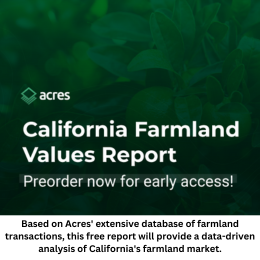June 9, 2021
By Adam Bergman, Managing Director, EcoTech Capital
Almost two years to the date of Beyond Meat’s initial public offering (IPO), Oatly, a plant-based dairy replacement company, went public on May 19, 2021. Just like Beyond Meat’s IPO, Oatly was well received by investors as its stock price rose when trading began, reaching an equity value of over $12 billion on its first day of trading. This strong stock price performance is a reflection not only of Oatly’s growing presence as a leading alternative dairy provider but also of the increased interest from investors who are turning their attention to options beyond traditional animal proteins. This is because more and more, today’s consumers, particularly younger generations of Millennials and Gen Z, are turning their backs on industrial agriculture, which provided cheap and abundant food, but has caused environmental devastation and created a society of obese people struggling with diabetes, heart disease, and other health ailments. Alternative proteins, including plant-based and cellular-based dairy and meat products, are making an impact with investors and consumers alike.
Oatly, the Dairy Alternative Unicorn
Similar to leading plant-based meat companies Beyond Meat and Impossible Foods, Oatly is not a recent start-up, having been founded more than 25 years ago by two food scientists, brothers Rickard and Bjorn Oste. Oatly has faced many of the same challenges, including taste, texture, and cost, that plant-based protein companies experienced in developing and scaling products that appeal to all consumers, rather than to niche groups of vegetarians or vegans. Oatly’s name recognition and market traction has accelerated during the COVID-19 pandemic with the company’s products currently available in 60,000 retail locations and over 30,000 coffee shops worldwide. In particular, Oatly has been able to leverage the growing interest in alternative proteins to generate partnerships with leading global retailers Starbucks, Target, and Alibaba. These relationships have enabled Oatly to generate lots of publicity without having to spend as much on advertising, in a similar way that Burger King and Dunkin’ provided significant advertising support for Impossible Foods and Beyond Meat, respectively.
These partnerships appear to have benefited Oatly, based on its public filings, which show that it generated $421 million in sales in 2020, up 106 percent from 2019. This is impressive growth for a consumer packaged goods (CPG) firm of that size is an indication that even during a global pandemic, Oatly has been able to get its message and products to a growing consumer base. It will be interesting to see if Oatly is able to maintain this strong growth or might experience some of the same challenges other alternative protein companies faced when trying to grow rapidly. To help overcome any hurdles to growth, Oatly has announced that it plans to use some of its $1.4 billion IPO proceeds to build out its production capacity globally.
While Oatly is mostly known for its oat milk product line, the company has begun to expand into other areas including non-dairy versions of cheese, ice cream, and yogurt. Although these categories have lower penetration rates today than the alternative milk sector, they have the potential to grow rapidly. Oatly is not alone in moving into other alternative dairy products, as leading CPG companies, including Chobani and Danone, also have focused efforts to roll out new plant-based options. As well as these established CPG companies, a number of smaller, cellular-based, and plant-based companies (Califia Farms, Perfect Day, Ripple Foods) have raised large amounts of venture capital and either are selling their non-dairy protein products today, or will in the very near future.
Meatless Mondays
Alternative protein companies, including Oatly, have greatly benefited from today’s consumers demanding fresher, healthier, and more nutritious foods that taste great and are grown and transported more sustainably. This message is resonating with retailers, including the likes of Starbucks, which earlier this year began offering a $2 discount on its vegetarian breakfast items every Monday in January. Starbucks’ management said that its Meatless Monday campaign supports its effort of becoming a resource-positive company, a goal it hopes to achieve in large part by focusing on plant-based foods and beverages. Starbucks’ announcement is in line with many other organizations, including New York public schools, which launched Meatless Monday in fall 2019. This idea grew from an initiative in 2003 by The Monday Campaigns, a non-profit organization, in association with the Johns Hopkins Bloomberg School of Public Health Center for a Livable Future.
While the Meatless Monday campaign has continued to grow and gain followers globally, the key driving force behind the growth of alternative proteins has been the huge marketing campaigns for Burger King’s Impossible Whopper and Dunkin’s Beyond Breakfast Sausage. Interestingly, despite the huge growth in consumption of alternative meat products, including over [100 percent] growth in sales in grocery stores, according to Nielsen’s, alternative meat only accounts for ~4 percent share of meat sales. In contrast, the alternative dairy sector, where Oatly competes, is more established, having already grown to a market share of ~13 percent of dairy products. This is because, unlike the meat replacement market, the alternative dairy sector started with a focus on creating options for consumers suffering from lactose intolerance and other food allergies. Since the launch of those initial products, generally plant or nut based, consumers have grown more open to dairy replacement options that have improved in both taste and texture, with the result that these days there are numerous product options at supermarkets and other retail locations throughout the U.S.
Cellular-Based Meat is the Future
Oatly isn’t the only alternative protein company that recently completed a large financing round. Eat Just, a U.S. FoodTech company developing a range of plant-based and cellular-based alternative proteins, raised $170 million in May 2021 to help expand Good Meat, its cellular-based meat subsidiary. Capital came from global investors, including UBS O’Connor, a hedge fund manager within UBS Asset Management, Graphene Ventures, K3 Ventures, and will be used to increase Good Meat’s production capacity and accelerate research for cultivating meat from cells harvested from animals. Eat Just began selling its cellular-grown chicken meat, according to its CEO, Josh Tetrick, at the end of 2020, after it received from Singapore the world’s first regulatory approval to sell cultured meat to consumers. In March 2021, Eat Just raised $200 million from Qatar Investment Authority, Charlesbank Capital Partners, and Vulcan Capital for its more established plant-based egg replacement business. These two fundraises show both the significant amount of capital needed to expand alternative protein businesses as well as the availability of global capital from investors. Luckily for cellular-based protein companies, investors are drawn to this area due to the market opportunity of the global meat industry, which global consultancy AT Kearney estimates could reach $1.8 trillion in 2040, of which 35 percent could be captured by cellular-based meat.
Although there is growing excitement around cellular-based meat, there remain significant impediments, including the need for companies to get approval from the U.S. Department of Agriculture and the Food and Drug Administration before they can offer their products to the U.S. public. It took Eat Just almost two years to get approval in Singapore, which has an initiative called “30 by 30,” to produce 30 percent of its food supply locally by 2030. The initiative was prompted because Singapore currently imports over 90 percent of its food, making it vulnerable to export bans or the logistics issues highlighted by the COVID-19 pandemic. In contrast, the U.S. and Europe don’t have the same food insecurity issues as Singapore, so I would expect regulatory approval, which has started in the U.S., will be a much more challenging process. This is because there is less of a strategic imperative, and vested interests in the cattle and meat processing industry are prepared to use all their resources and government relationships to push back approval for as long as possible.
Additionally, unlike the plant-based protein industry, which has been around for generations with earlier, although less appealing products including garden burgers and tofurky, cellular-based proteins are a new food product and it is impossible to predict how long it might take for them to get market traction. Many consumers will likely have to overcome their initial concerns about meat grown in labs or fermentation tanks. Nevertheless, I believe that cellular-based products will achieve significant market share, because they will have taste advantages over plant-based protein, environmental sustainability advantages over animal protein, and in the future could end up being the lowest cost products.
I believe that alternative proteins (cellular-based, plant-based, and even bug-based) will continue gaining customers this decade, and sales will even accelerate in the 2030s as companies hone their products’ taste, texture, and costs. This is because, despite all the advantages of incumbency, it is becoming clearer each day that the animal protein industry is on the brink of going the way of other once thriving industries, including horses for transportation, pigeons for communications, and whales for oil. Technological revolutions shaped transportation, communications and energy, and now it is agriculture’s turn to be under the spotlight, and there is no reason to believe it will be any different this time. Technology is helping solve problems of health, nutrition and environmental damage. With more consumers focusing on environmental sustainability, the case for alternative proteins is becoming more compelling.
ABOUT THE AUTHOR:
 Adam Bergman is managing director of EcoTech Capital, a boutique investment bank at the intersection of technology innovation and climate change. Bergman is a sustainability executive leader with over 20 years’ experience raising capital and executing M&A transactions. He also provides strategic advice and financial guidance to senior executives and boards on strategic partnerships and growth strategies. As one of the first investment bankers to focus exclusively on the CleanTech sector, starting in 2005, Bergman is a frequent speaker at industry events and publisher of articles on sustainability. During the last five years, Bergman built an industry leading AgTech & FoodTech investment banking practice creating a broad ecosystem to help drive adoption of technology and innovation throughout the broad food & ag value chain. Additionally, Bergman established the AgTech cohort for Wells Fargo’s innovation incubator (IN2), which was launched at the Donald Danforth Plant Science Center in St. Louis, MO, in 2018. Over the past 20-plus years, he has worked for leading global investment banks, including Deutsche Bank, Jefferies, JPMorgan, Rothschild, UBS and Wells Fargo, and has completed over $12 billion in domestic and international financings and over $25 billion in domestic and cross border M&A, restructuring and strategic advisory transactions. Bergman is a registered representative with and securities offered through Finalis Securities LLC, member FINRA, SIPC.
Adam Bergman is managing director of EcoTech Capital, a boutique investment bank at the intersection of technology innovation and climate change. Bergman is a sustainability executive leader with over 20 years’ experience raising capital and executing M&A transactions. He also provides strategic advice and financial guidance to senior executives and boards on strategic partnerships and growth strategies. As one of the first investment bankers to focus exclusively on the CleanTech sector, starting in 2005, Bergman is a frequent speaker at industry events and publisher of articles on sustainability. During the last five years, Bergman built an industry leading AgTech & FoodTech investment banking practice creating a broad ecosystem to help drive adoption of technology and innovation throughout the broad food & ag value chain. Additionally, Bergman established the AgTech cohort for Wells Fargo’s innovation incubator (IN2), which was launched at the Donald Danforth Plant Science Center in St. Louis, MO, in 2018. Over the past 20-plus years, he has worked for leading global investment banks, including Deutsche Bank, Jefferies, JPMorgan, Rothschild, UBS and Wells Fargo, and has completed over $12 billion in domestic and international financings and over $25 billion in domestic and cross border M&A, restructuring and strategic advisory transactions. Bergman is a registered representative with and securities offered through Finalis Securities LLC, member FINRA, SIPC.
All views, data, opinions and declarations expressed are solely those of the author(s) and not of Global AgInvesting, GAI News, or parent company HighQuest Group.

Let GAI News inform your engagement in the agriculture sector.
GAI News provides crucial and timely news and insight to help you stay ahead of critical agricultural trends through free delivery of two weekly newsletters, Ag Investing Weekly and AgTech Intel.




